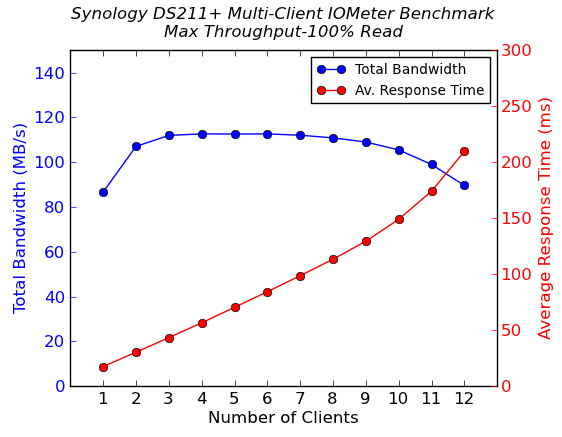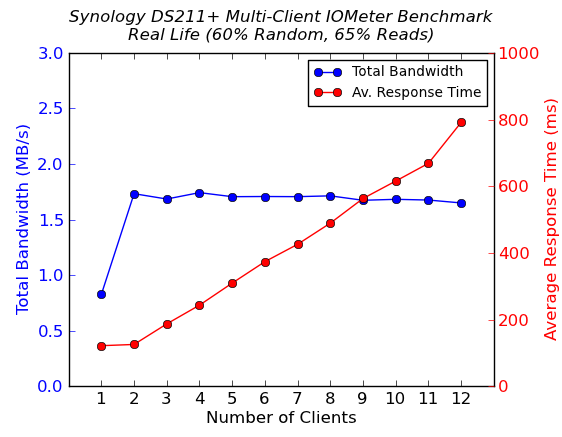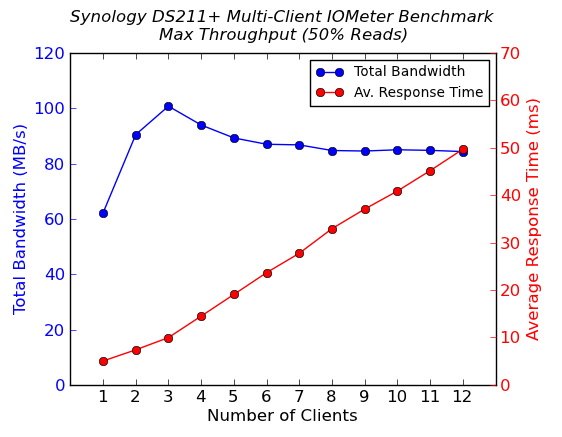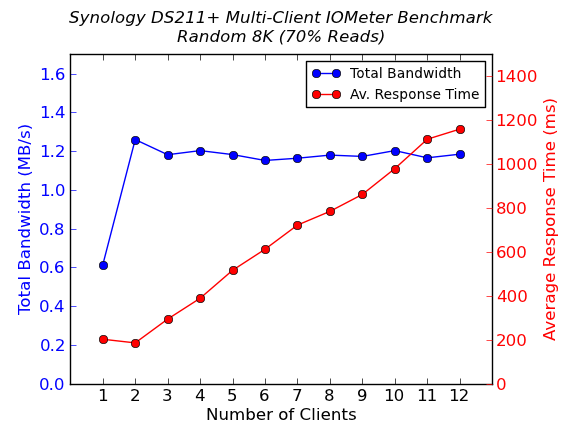Building the 2012 AnandTech SMB / SOHO NAS Testbed
by Ganesh T S on September 5, 2012 6:00 PM EST- Posted in
- IT Computing
- Storage
- NAS
Testbed in Action : Synology DS211+
One of the first NAS units that we put through our new test suite was the Synology DS211+. The following four graphs show the total available bandwidth and the average response time while being subject to different types of workloads through IOMeter. IOMeter also reports various other metrics of interest such as maximum response time, read and write IOPS, separate read and write bandwidth figures, etc. Selected metrics from the evaluation of the Synology DS211+ are available here. The values corresponding to the points plotted below can also be seen in the above link.




The first graph shows that the DS211+ is able to hit as high as 112.65 MBps in 100% sequential reads when five clients are simultaneously accessing the unit. However, for more than 7 clients, the total available bandwidth sees a decrease. In all the four cases, the average response time seems to increase only linearly. However, a look at the maximum response time in the above link shows that under some conditions, clients need to wait for as much as 10 seconds for a transaction to complete.
The Synology DS211+ seems to be a good fit for cases where there are 5 - 10 computers simultaneously accessing the unit, but performance seems to degrade with additional users.










74 Comments
View All Comments
xTRICKYxx - Wednesday, September 5, 2012 - link
May I ask why do you guys need such high requirements? And why 12 VMs? I just think this is overkill. But it doesn't matter anyways... If I had a budget like this, I would totally build an awesome NAS like you guys have and follow this guide. Great job!xTRICKYxx - Wednesday, September 5, 2012 - link
I should clarify I am looking at this NAS as a household commodity, not something where 10+ computers will be heavily accessing it.mfed3 - Wednesday, September 5, 2012 - link
still didn't read...this is hopeless..extide - Thursday, September 6, 2012 - link
Dude they are NOT BUILDING A NAS!!!They are building a system to TEST other NAS's
thomas-hrb - Thursday, September 6, 2012 - link
It would also be nice to test against some of the other features like for example iSCSI. Also since the Thecus N4800 supports iSCSI, I would like to see that test redone with a slightly different build/deployment.Create a single LUN on iSCSI. then mount that LUN in the VM like ESXi, create some VM's 20GB per server should be enough for server 2K8R2 and test it that way.
I don't know who would use NAS over SAN in an enterprise shop, but some of the small guys who can't afford an enterprise storage solution (less than 25 clients) might want to know how effectively a small NAS, can handle VM's with advanced features like vMotion and fault tolerance. In fact if you try some of those HP ML110G7 (3 of them with a vmware essentials plus kit) you can get 12 CPU cores with 48GB RAM, with licensing for about 10K. This setup will give you a decent amount of reliability, and if the NAS can support data replication, you could get a small setup with enterprise features (even if not enterprise performance) for less than the lost of 1-tray of FC-SAN storage.
Wixman666 - Wednesday, September 5, 2012 - link
It's because they want to be able to really hammer the storage system.The0ne - Wednesday, September 5, 2012 - link
"The guest OS on each of the VMs is Windows 7 Ultimate x64. The intention of the build is to determine how the performance of the NAS under test degrades when multiple clients begin to access it. This degradation might be in terms of increased response time or decrease in available bandwidth."12 is a good size, if not too small for a medium size company.
MGSsancho - Wednesday, September 5, 2012 - link
12 is also a good size for a large workgroup.. Alternatively this is a good benchmark for students in dorms. sure there might be 4-5 people but when you factor in computers using torrents, game consoles streaming netflix along with tvs, could be interesting. granted all of this is streaming except for the torrents and their random i/o. However most torrent clients cache as much of the writes. With the current anandtech bench setup with VMs this can be replicated.DanNeely - Wednesday, September 5, 2012 - link
The same reason they need 8 threaded benchmark apps to fully test a Quad-HT CPU. They're testing NASes designed to have more than 2 or 3 clients attached at once; simulating a dozen of them puts the load on the nases up, although judging by the results shown by the Thecus N4800 they probably fell short of maxing it out.theprodigalrebel - Wednesday, September 5, 2012 - link
Well, this IS Anandtech and the article is filed under IT Computing... ;)